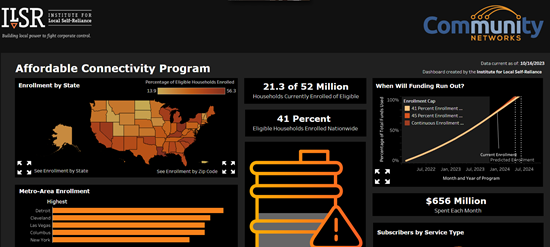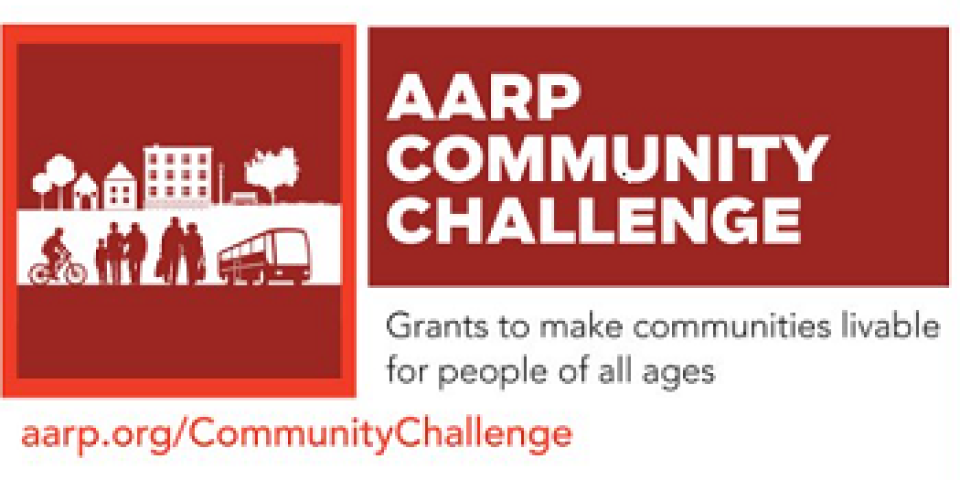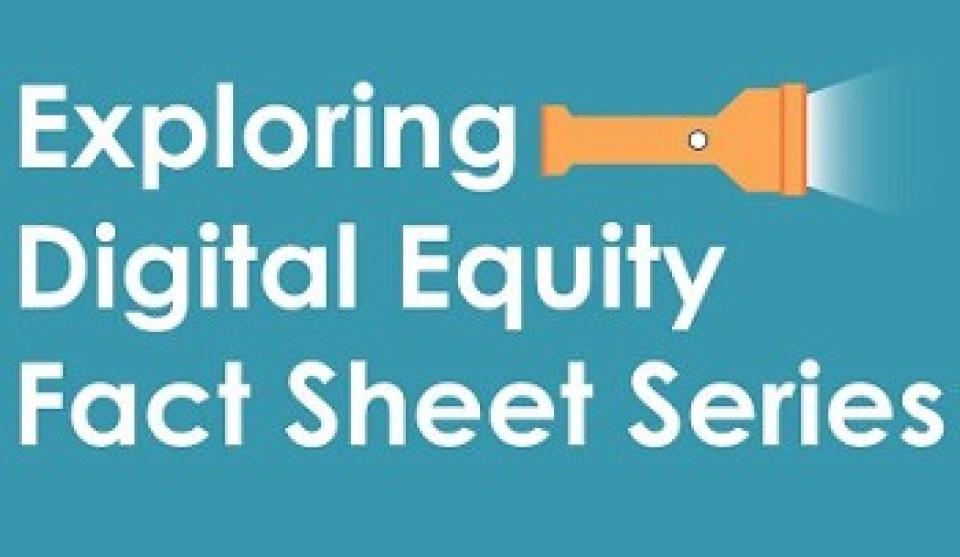
Fast, affordable Internet access for all.

As state and local broadband leaders engage “covered populations,” as defined under the Digital Equity Act, AARP and ILSR’s Community Broadband Networks Initiative has been working in partnership over the past two years to deliver “Broadband for Beginners” workshops in states across the country that target individuals 60 years of age or older – and those who work with them.
Next month, on Dec 7 from 8:30 AM to 5 pm ET, AARP Maine and the ILSR team will wrap up the year with an in-person workshop in Bangor, Maine. The all-day event is designed to demystify broadband technology and help empower older adults to join the effort to expand digital equity, most especially those who have been reluctant or fearful to explore the opportunities broadband access offers.

There is still time to register here.
The agenda will serve up a veritable buffet of broadband topics and leave participants stuffed with confidence in how to advocate for their needs in an increasingly digital society.
“We are thrilled to be working with AARP in Maine,” said ILSR Community Broadband Networks Director Christopher Mitchell. “The state of Maine is making great strides on Internet access and we look forward to supporting that work with many of the people responsible for it.”
Inline image of older adult typing on laptop courtesy of StockVault, CC0 1.0 Universal
With the $14.2 billion Affordable Connectivity Program (ACP) on track to run out of funds by spring/early summer 2024, finally there is a request from the White House to extend funding for the program that over 21 million housholds now rely on to help pay for high-speed Internet service.
Last week, the Biden administration formally asked Congress for another $6 billion to extend the program through November 2024, joining a chorus of public interest groups (including AARP) calling on Congress to replenish the rapidly depleting fund.
(According to our calculations, an additional $6 billion would not fund the program through December 2024 as the White House said. It would fund the program through the end of November 2024. It would take $6.9B to get through the end of December).

First established with the passage of the Infrastructure Investment and Jobs Act (IIJA) in 2021 as part of the Biden administration’s “Internet for All” initiative, the ACP – currently administered by the Federal Communications Commission (FCC) – provides income-eligible households with a $30 monthly subsidy ($75 per month for those living on Tribal lands) to pay for their Internet service bill. The program also provides a one-time $100 benefit to go towards the purchase of an Internet-connected device such as a laptop or tablet.
AARP has announced it is accepting applications for its seventh annual Community Challenge grant program, a funding source for nonprofit organizations and governmental entities to apply for “quick-action” projects that make communities more livable and have the potential to seed long-term change.
Previous grant awards were given for a wide-range of initiatives, including a 2021 project that provided Wi-Fi, smart home devices, a computer lab and digital literacy programming for older adults in a public housing development in Jersey City, NJ; and a 2019 program to help bridge the digital divide and social isolation by funding a hotspot lending program that distributed 60 hotspot devices.
This year, two new grant award categories have been established in addition to the Flagship Grants awarded in previous years. The two new grant categories are Capacity-Building Microgrants and Demonstration Grants.

Applications are due by March 15. Grant award winners will be announced on June 28 for projects that must be completed by November 30.
Flagship Grants
The Flagship Grants range between several hundred dollars for smaller, short-term activities to tens of thousands of dollars for larger projects with an average grant amount of $11,900.
AARP Minnesota has taken notice: “broadband infrastructure has not been deployed evenly to communities across the state.”
In an effort to raise awareness about the “good news” of state and federal investments to expand infrastructure and how local leaders and residents can learn how to push for better broadband access in their communities, the Minnesota chapter of the AARP will host a “Critical Access: Broadband Expansion in Minnesota” webinar beginning at 1 p.m. CT Wednesday, Aug. 24.

Our own Christopher Mitchell, Director of Community Broadband Networks with the Institute for Local Self-Reliance, will be a featured speaker for the one-hour event and will be joined by Cathy McLeer, State Director for AARP Minnesota, as well as Lori Vrolson, Executive Director of the Central Minnesota Council on Aging.

McLeer has been with AARP Minnesota since 2005, having first served as the Associate State Director for Communications in the South Dakota State Office, then as a Senior Advisor for the Central Region, before becoming the Minnesota State Director where she has been a powerful advocate on behalf of Minnesota’s 630,000 AARP members.
What is digital equity? And why is access to ubiquitous, reliable and affordable high-speed Internet service so vital? The technological issues involved can sometimes seem confusing, especially for those who came of age before the Internet fundamentally transformed how we interact.
That’s why the Institute for Local Self Reliance, with support from AARP, has created the Exploring Digital Equity Fact Sheet Series. The series contains six user-friendly, easy-to-understand fact sheets to help demystify the challenges associated with creating digital equity.
We are releasing the entire series today, while AARP will feature the fact sheets as part of its Livable Communities initiative, an effort to support neighborhoods, towns, cities and rural areas in creating safe, walkable streets; age-friendly housing and transportation options; access to needed services; and opportunities for residents of all ages to participate in community life.
Both ILSR and AARP have created landing pages for the fact sheets as well. You can find our landing page here, and the fact sheet landing page for AARP here.

The fact sheets series ultimately highlight how expanding Internet access to everyone who wants it isn’t an infrastructure problem alone. Achieving digital equity for everyone in a community is a multi-faceted endeavor, and requires engaging and activating an array of stakeholders. The Exploring Digital Equity Fact Sheet Series unpacks the issues, challenges, and opportunities today.
AARP has announced the latest round of its Community Challenge Grant Program, an effort to direct funding towards building more resilient, livable, equitable communities around the country. Applications for the current round are due March 22nd at 5pm ET.
Part of the AARP's Livable Communities initiative, this is the sixth iteration of the grant program, which led to the funding of more than $9 million in projects across 800 grants to nonprofits and local governments in rural, urban, and suburban areas. This includes everything from improved city infrastructure, to trainings, to new volunteer programs, to the support of local cultural and art initiatives.
Watch a video of the announcement below, or visit here to learn more.
This month Director of the Community Broadband Networks Initiative for ILSR Christopher Mitchell will join the panel for a four-part virtual series on developing communities that foster safe and thriving lifestyles for an aging population. The North Carolina, Virginia and Tennessee AARP offices are partnering to present the Livable Appalachia Summit in an effort to bring experts and local leaders together to share ideas and connect about the best way to support their communities.
Mitchell will be the keynote speaker for the second part of the series, “Our Connections: Creating Broadband Networks” which will be on Oct. 15. He will be one of six experts and leaders discussing what rural communities across the country are doing to close the digital divide by connecting underserved communities. They will talk about opportunities and barriers that exist when it comes to providing low-cost access to lower-income households.
The series started on Oct. 1 and will run through Dec. 3. Sessions will run from 10:00 AM - 11:30 AM. More details are below:
Presentations/Discussions:
10/1 Our towns: Growing with Grace
10/15 Our connections: Creating Broadband Networks
11/12 Our homes: Affordable and Accessible Housing
12/3 Getting there: Transportation Solutions
Register for the event here.
Yet again, lobbyists from AT&T, Windstream, and Cincinnati Bell are lobbying state elected officials under the false guise of improving communications in Kentucky. In a Richmond Register opinion piece, Mimi Pickering from the Rural Broadband Policy Group revealed the practical consequences of Senate Bill 99.
Republican Senator Paul Hornback is once again the lead sponsor on the bill. As usual, backers contend the legislation moves Kentucky communications forward. Last year, Pickering and her coalition worked to educate Kentuckians on SB 88, that would have eliminated the "carrier of last resort" requirement. We spoke with Pickering about the bill in Episode #44 of the Broadband Bits podcast. They had a similar fight in 2012.
In her opinon piece, Pickering describes the practical effect of this policy change:
It would allow them to abandon their least profitable customers and service areas as well as public protection obligations. But it is a risky and potentially dangerous bet for Kentuckians. Kentucky House members should turn it down.
Everyone agrees that access to affordable high-speed Internet is a good thing for Kentucky. However, despite what AT&T officials and their numerous lobbyists say, SB 99 does nothing to require or guarantee increased broadband investment, especially in areas of most need.
AT&T Kentucky President Hood Harris claims that current Kentucky law prevents the company from investing in new technology. As Pickering points out, AT&T refused to build in unserved areas when offered federal funds. Those funds came with minimum obligations; AT&T was not interested.
The war over keeping copper alive rages on in New York with more stealthy antics from Verizon. Stop the Cap! now reports that, rather than wait for a hurricane to take out the copper lines in the Catskills, it will quietly shift seasonal home owners to VoiceLink as they request reconnection. Stop the Cap! also published a letter [PDF] from the Communication Workers of America (CWA) who allege Verizon has also been installing VoiceLink in the City.
We recently visited this drama with Harold Feld from Public Knowledge on Broadband Bits podcast #52. He and Christopher discussed the issue as it applies to Fire Island in New York and Barrier Island in New Jersey. Verizon has permission from the New York Public Services Commission (NYPSC) to use the VoiceLink product in place of copper wires on a temporary basis as a way to get service to victims of Hurricane Sandy. Seven months is a long time to go without phone service.
Our readers know that VoiceLink short changes users, especially those that rely on phone connections for Life Alert, want to use phone cards, or want the security of reliable 911 service. Feld also noted in his Tales from the Sausage Factory blog, that Verizon was rumored to be making secret plans to expand VoiceLink well beyond the islands, regardless of the limitations of the NYPSC order.
Earlier this year we reported on SB 88 in the Kentucky legislature. The bill, sponsored by Republican Senator Paul Hornback and authored by AT&T, would have eliminated the "carrier of last resort" requirement and reduced consumer protections. A similar bill in 2011 was also defeated by a coalition of public interest groups.
This is one of a series of bills crafted by AT&T and ALEC that has been explained in great depth by the National Regulatory Research Institute in their 2012 review [pdf] as well as by Bruce Kushnick in this report [pdf].
Advocates on the side of consumers, including ILSR, were happy to see the bill defeated in the House. Though AT&T will undoubtedly be back again in future years, this victory shows the massive corporate carriers are vulnerable. In addition to blocking harmful deregulation, this is an example of how an organized coalition can protect the public interest.
I spoke with Mimi Pickering, Director of the Appalshop Community Media Initiative in Whitesburg, Kentucky. She described how local groups defeated the bill with the facts. Appalshop teamed up with nonprofit Kentucky Resources Council (KRC), AARP Kentucky, the AFL-CIO, Kentuckians for the Commonwealth, and several other groups. The coalition explained the complexities of the proposal and spelled out what could happen to landline service without consumer protections.